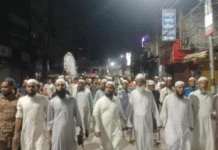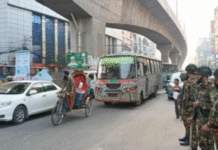
The deposed prime minister and Awami League president Sheikh Hasina, along with six others, were sued on Tuesday on charges of killing a grocery shop owner in the capital’s Mohammadpur.
The grocery shop owner, Abu Sayed, lost his life during a police shooting incident during student-led protests for quota reform in government services on July 19.
SM Amir Hamza Shatil, a resident of the Mohammadpur area, filed the case with the Dhaka chief metropolitan magistrate court, bringing murder charges against Hasina, two former ministers, and four police officials.
Metropolitan Magistrate Rajesh Chowdhury recorded the statement of the complainant and ordered the Mohammadpur police station to register the case, said the plaintiff’s lawyer Md Mamun Miah.
The police will now investigate the case and file a report with the court, he said.
The other six accused are Awami League general secretary Obaidul Quader, former home minister Asaduzzaman Khan, former inspector general of police Chowdhury Abdullah Al Mamun, former Detective Branch chief of DMP Harun Or Rashid, former DMP commissioner Habibur Rahman, and former DMP joint commissioner Biplob Kumar Sarker.
This marks the first legal action taken against Hasina since she resigned as prime minister and fled to India on August 5 amid massive protests.
The development came amid calls from student protesters to charge Hasina and her associates with murder for the deaths of over 500 people, including students and civilians, during weeks of violence since July15.
According to the case statement, grocer Abu Sayed was hit by a bullet and died on July 19 around 4:00pm when he was crossing the street as police were firing on protesting students and other people demonstrating against the quota system in government jobs in Mohammadpur.
The complainant blamed Hasina, who had called for strong action to quell the violence, for the police firing.
Hamza said that he was not related to Sayed but voluntarily approached the court because the victim’s family lives in Panchagarh’s Boda upazila and did not have the financial ability to file the case.
The student-led movement started in early July with demonstrations against the quota system in government jobs before spiralling into violent protests to oust Hasina.
The student-led uprising forced Hasina to leave office and flee to India, ending her 15-year-long regime.
After two days of her fall on August 5, an interim government was formed on August 8, led by Nobel laureate Professor Muhammad Yunus, comprising members of student leadership and civil society representatives.
Hasina and AL’s almost all top leaders have either gone into hiding in the country or abroad, while some have been barred from leaving the country.
Hours after filing the case against Hasina, Dhaka Metropolitan Police chief Mainul Hasan confirmed to New Age the arrest of former law minister Anisul Haque and Hasina’s former adviser Salman F Rahman.
The two, however, were arrested in separate cases filed with the New Market police station in Dhaka.
Throughout Hasina’s 15-year tenure since 2008, her administration has been accused of widespread human rights abuses, killings, and forced disappearances of opposition people.
The Student Movement Against Discrimination demanded on Monday the trial of Sheikh Hasina on genocide charges for killing students and other protesters.
They also urged the government to file genocide cases against Hasina with the International Crimes Tribunal.
Hasina, 76, was elected to a fourth consecutive term in January, but the vote was boycotted by the main opposition parties.
Before her past 15-year term between 2008 and 2024, she was first made prime minister in 1996 and ruled the country for five years.
At least 15 cases were filed between 2001 and 2008 against Sheikh Hasina, when she was out of power, on charges of corruption and extortion.
Of the cases, eight were filed during the BNP-led alliance’s rule between 2001 and 2005 and the rest during the tenure of the Fakhruddin Ahmed-led army-controlled caretaker government between 2006 and 2008.
After she came back to power in January 2009, the cases were either withdrawn by the accuser, thrown out of court, or discontinued.
The cases include the case filed for graft in the purchase of MiG-29s, graft in the construction of Bangabandhu Planetarium, the Meghnaghat power plant case, the Bepza corruption case, the barge-mounted power plant case, and the Niko graft case.

Top, from left, Obaidul Quader, Asaduzzaman Khan, Chowdhury Abdullah Al Mamun, and bottom, from left, Habibur Rahman, Harun Or Rashid, and Biplob Kumar Sarker. — New Age photo
new age









